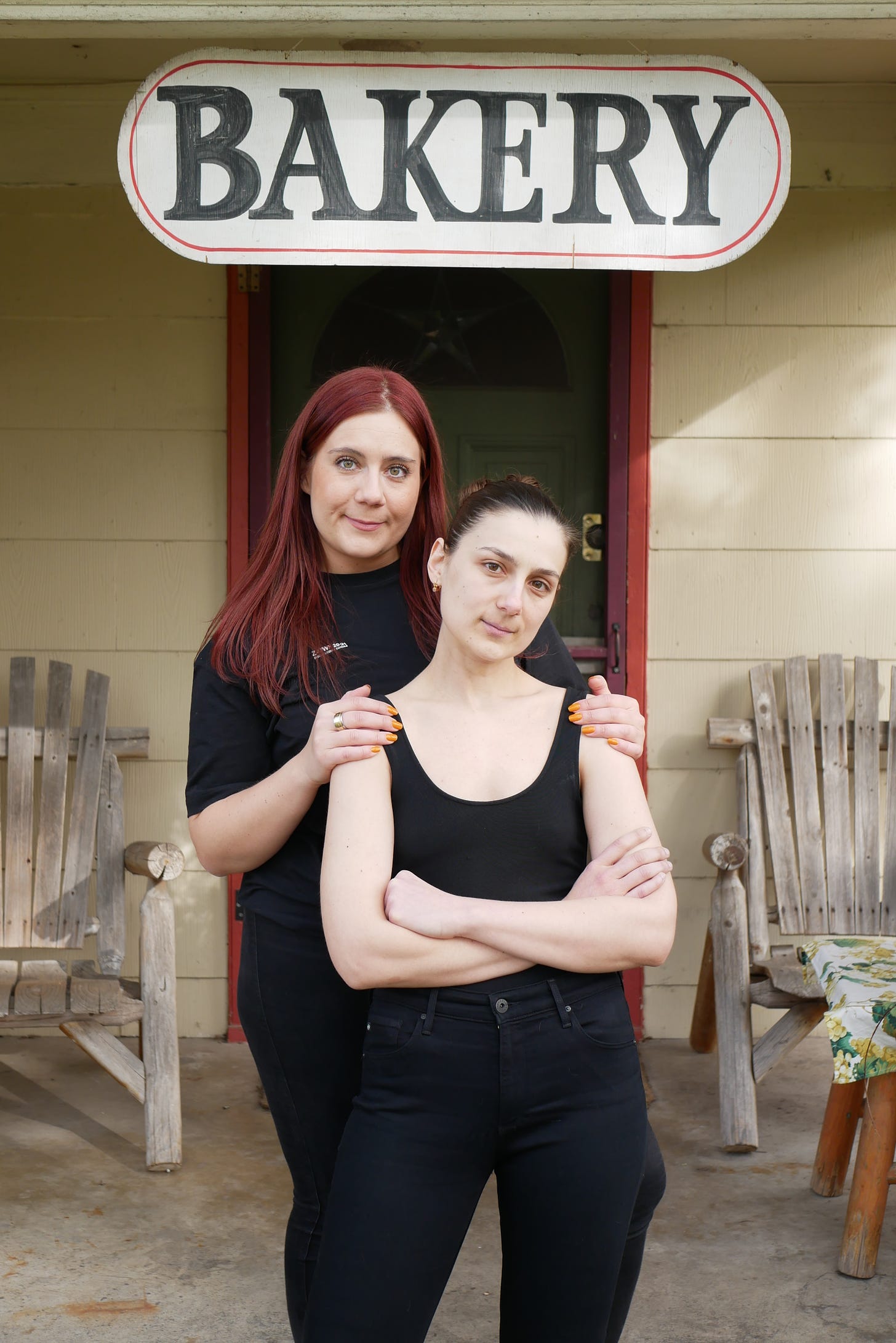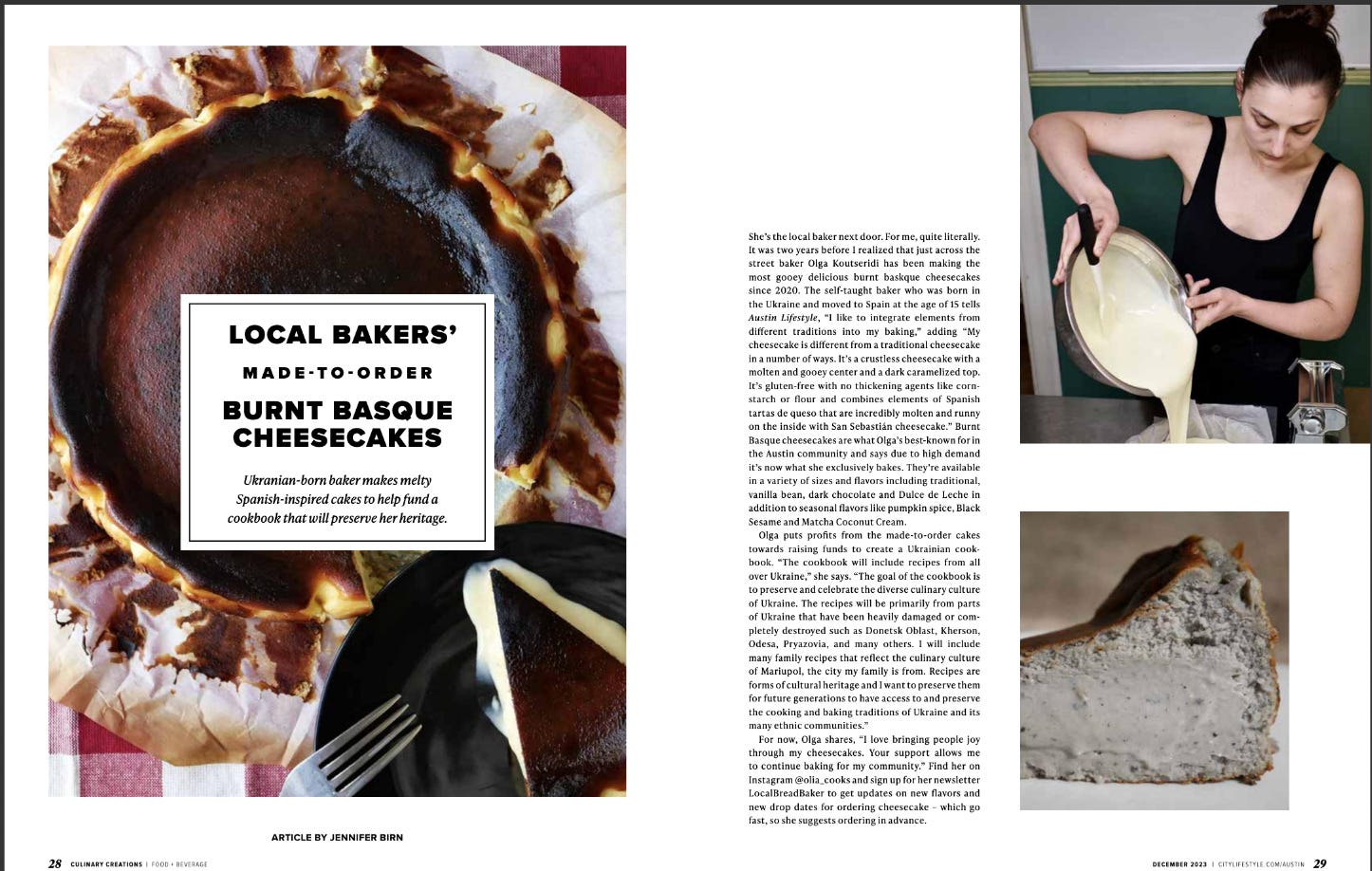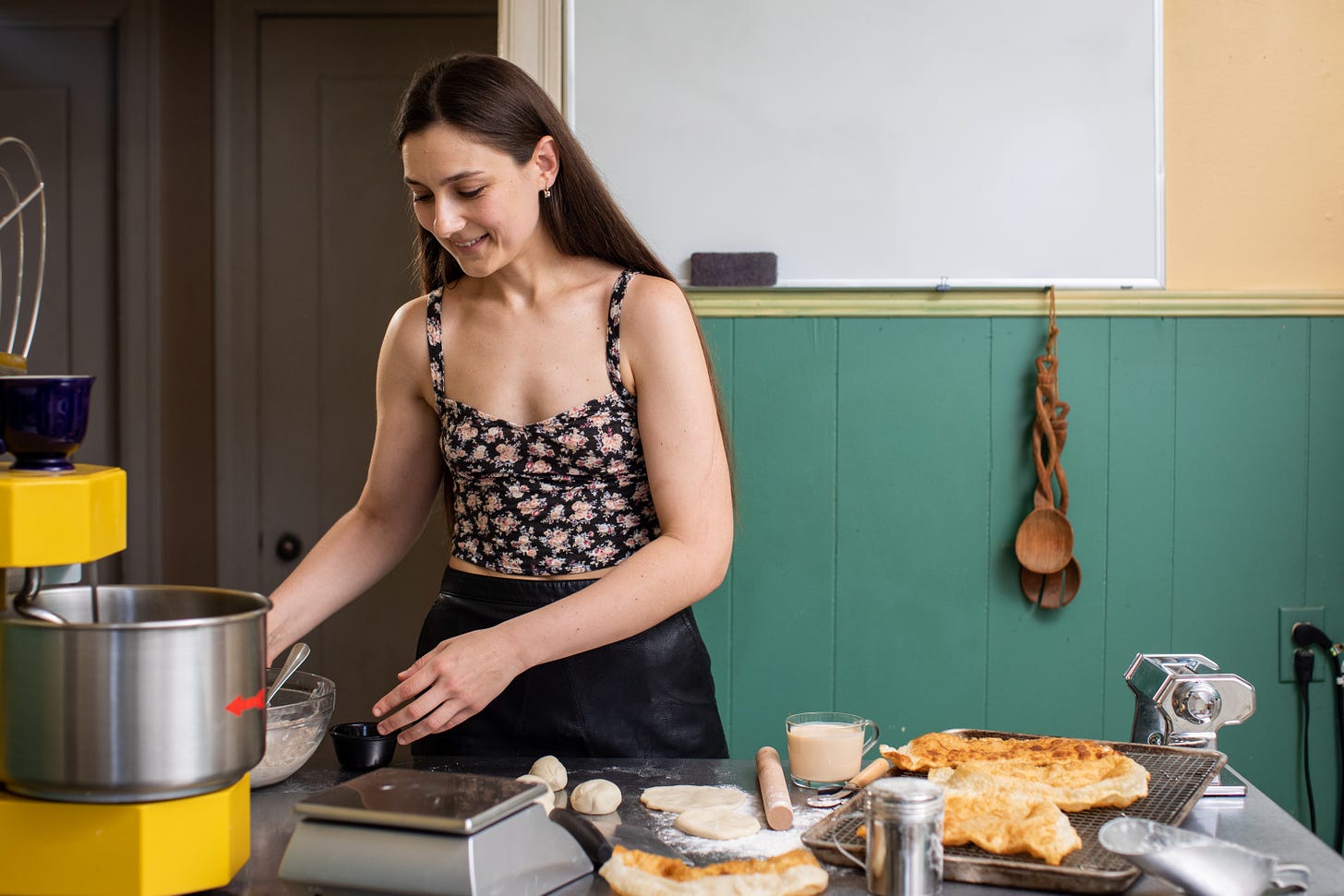15 Lessons I Learned Running a Home Bakery in Austin
Or A List of Things I Would Do Differently
If you’re enjoying this newsletter, please consider becoming a paid subscriber. It’s only $24 a year and you get a complimentary copy of my BURNT BASQUE CHEESECAKE RECIPE ZINE.
Running a micro bakery is no joke! It is also one of the most fulfilling things I have ever done in my life, and it’s going to be quite an adjustment to not bake for others for a while. Probably not until we figure out what the next year or so of our life will look like.
As a disclaimer, this is not a how-to-guide for opening, setting up, or running a home bakery, there are many of those already out in the internet world. Instead, I wanted to share some of the major lessons I learned over the last 5 years of running a home bakery. These are definitely all the things I wish I knew before starting this wild adventure! This is by no means a comprehensive list, and I promise to keep sharing more of my experiences as a home baker—some of those episodes would make a great premise for a short story or two.
Leave your advice and questions in the comments.
It’s a (Small) Business
But don’t let the word “small” trick you! You will be running a business. It will no longer be a hobby. It’s not just a place where people get delicious treats. You need to be prepared to wear a million different hats. You are now the baker, owner, and manager of a small business. You will be responsible for every aspect of the bakery from tracking inventory to customer communication (a lot of it) to baking logistics and schedules, to marketing, to accounting, to organizing collaborations, to planning menus, to filing taxes, and so on. Remember you are opening, operating, and managing a small business and everything else that comes with being an entrepreneur. Opening a home bakery is a great way to test your tolerance for running a small business, the upfront financial investment can be quite low and you will gain valuable life experience no matter the outcome.
Be Realistic About Bandwidth
I am serious! This sounds super obvious, but once you get going you might forget it. Schedule rest and recovery for your body and mind! Be honest with what you can and cannot do on a weekly, monthly, quarterly, and annual basis. This often requires checking in with yourself and having some frank conversations. You do not want to borrow from tomorrow to push through today. Remember this is a marathon not a sprint. You don’t want to burnout without the first couple of months of running the bakery (seriously learn from my mistakes!) For example if you know that offering delivery will cause more harm than good, don’t offer it. Don’t say yes to every order! Start small and build from there. If you released 20 order slots and it felt manageable you can use that information to inform your decisions about next week’s quantities and so forth.
Over-committing to orders will only lead to immense stress and possibly even derailing your entire production because of it. If you are continuously struggling to meet demand, it’s probably time to have a conversation with yourself about where to go next, but don’t jump into the deep end right away.
Planning + Organization is Important
Planning ahead is super important. You NEED to plan ahead. Since you are managing every aspect of the bakery you need to make a lot of decisions. My advice to my younger self would be to invest time each week (Sunday) on planning two weeks ahead. You can use that time to schedule shopping trips for restocking supplies and ingredients, decide on a baking schedule/menu (I had to plan mine around your full time job), create events and menus (seasonal, weekly, monthly), plan out marketing, and so on.
Focus on Your Community
This is super important for any business but especially a bakery. People will learn about you by word of mouth, and you want to cultivate strong relationships with your clients, especially your regulars. Try to participate in community events whether that’s a bake sale for a charity or raising funds when the community is in need. If you bake bread, offer special pricing for people from lower socioeconomic backgrounds, participate in community events, and offer products that make your community happy. And be honest with people, even if you’re anxious or embarrassed—sometimes plans don’t work out, sometimes our eyes are bigger than our stomachs, and sometimes life happens really hard and really fast.
Connect with Other Bakers and Folks in the Service Industry
I bake for a lot of chefs, restaurant managers, culinary professionals, and folks in the service industry. It started with one chef and grew from there. I also did a short stage at a local bakery introducing me to more folks in the service industry. Doing a stage or even doing an informational interview with another home baker can be super helpful!
You are going to need help as a new food business owner and the best way to find mentorship is by connecting with people in the food industry. My friend Beto, the owner and chef of the incredible Cuantos Tacos, has been such an important source of support especially when I was just getting started. He knew where to buy or get equipment, helped me get a second fridge, and provided me with a ton of business advice. Try to also find other home bakers to connect with. This can help so much in fostering a sense of support and community, it can get lonely spending your days alone in the kitchen.
Ask for Help
I know some of us struggle with this idea, but opening a cottage bakery as a team of one is a nightmare. I was fortunate enough to rely on a lot of help from my sister and partner. My sister handled all of the orders, while I was in the kitchen baking. She was responsible for bagging orders, greeting customers, and bringing out orders to people’s cars. This was also my first venture as a small business owner and I knew close to nothing about operating a business. My friend Shelly was generous enough to build me a spreadsheet that I could use to do cost analysis and track expenses for supplies and ingredients. I will forever be grateful! If you are reading this, thank you so much, Shelly!
Baking and Capitalism Don’t Mix
Hear me out. I am going to be blunt. There’s little money in baking, especially bread baking. Running a cottage bakery is as much about production as a full scale bakery. In order to make ends meet you will need to work out the math for how much money you need to bring in from sales to continue to operate. If you are charging $8 per sourdough loaf, how many loaves a week or a weekend do you need to sell to break even, and eventually make a little profit. The profit margins for most bakeries are terrifyingly low. Ideally we would live in a society where bakeries are subsidized by our local, state, and federal governments, but we do not, we live in a profit driven world where feeding people is way less important than making money. This is also to say that you should go into this process with realistic financial goals and periodically do a deep dive into your sales, as boring as it might be.
Take Breaks
You HAVE to take breaks. Force yourself if you have to. Remember how I just mentioned burnout. Well if you don’t take breaks periodically (whatever that means for you), you will most likely burnout a lot faster, once again learn from my mistakes. Don’t be afraid to close orders for one weekend a month or whatever you need to recover both physically and emotionally. Remember you will be doing a lot of physical and emotional labor (customer service), and I mean A LOT. So make sure to have time built into your schedule for recovery and self-maintenance.
This is Your Life Now
If you are planning on opening a home bakery while working full-time, the best time to bake is Friday and Saturday and do orders on weekend. This of course means that you will be working 7 days a week. Hence why taking a weekend off from baking here and there in the long run is so much better for you, your physical, emotional, and mental health. At the same time baking is very time sensitive and therefore a time demanding endeavor. You need time to bake, pack, schedule or deliver orders, shop, etc. Most of these things will overlap with the majority of what used to be your free or social time. At the same time, don’t constantly say no to social events, you need to recharge your battery periodically and being social is key to our mental health. Socializing is also an opportunity to tell folks about your baking.
Design A Smart Menu
This point is closely connected with several others. Start by asking yourself, can I have a rotating weekly menu? How many items can I put on my menu without feeling overwhelmed and stretched thin? This is especially important when you are just starting because you will need time to adjust and pivot, so start small.
Make sure to ask yourself, what can I bake that aligns best with my current abilities, schedule, equipment, and environment? If you are operating as a team of one, can you realistically bake and do orders on the same day? What are you set up to bake or produce in large quantities? Let me share an anecdote. My sister and I decided to do freshly fried doughnuts, and let me tell you, as wonderful as the idea was, we were not set up for doughnut production! So experiment within reason, and be strategic about what you put on your menu.
Grow Organically and Avoid Unnecessary Debt
Do you really need that extra oven the first couple of months you are open? Maybe instead of taking out a loan or putting it on a credit card you can first test drive the bakery. You absolutely should invest into your vision, but you don’t have to make unnecessary financial decisions that will lead to financial issues down the line. If you notice that you are selling out of loaves super quickly, you will need money to buy a bigger mixer. At the same time, pause periodically and ask yourself what do I or the bakery need to increase production or streamline production. But you need data before you can make informed decisions, at least that’s my humble opinion. One piece of advice I got from a seasoned bread baker is to set up your home bakery for scaling.
Understand and Work With Your Environment
This is closely connected to having a strategic menu. Let’s say you have very limited fridge space and you live somewhere hot but you want to offer Tartine style bread, is that going to be possible in your current environment? Or does it make sense to work with baked goods that align with and not work against your environment and its limitations. This also applies to your tools and equipment. If you don’t have the financial means to initially invest in a piece of machinery that you need to produce a certain baked good in the quantities you need it’s probably best to keep those items off the menu until you raise enough funds to expand. Take some time and think about what you can produce consistently given your financial, environmental, health, and other constraints.
Pick a Food Sales Platform That Works for You
When I first started I was taking orders over email! It was chaos. Lots of spreadsheets and back and forth email communication with individual clients. Nowadays there are a lot more options for ordering and food sales systems. The one I use is called, Hotplate. It is operated and run by a small but hard working team. Rishi found me on Instagram and I was one of their early adopters. The platform worked great for me because I would release weekly orders and folks could seamlessly place orders, get pick up details, and complete the transaction. Hotplate also has a helpful order tracking system that we use for prepping, packing, and pick ups. You can learn more about Hotplate here.
Be Ready for the Holiday Baking Rush
I knew I would get busy during the holidays, but I didn’t know (partially because no one warned me) just how insane bakeries get during the holiday season. Here in the U.S. that’s usually a week or so before Thanksgiving through New Year. Your sales for this period will be higher than your sales from several months, this of course depends a lot on what you bake (wedding cake bakers probably have different busy seasons), but plan on being extra busy those weeks! Be mindful of how seasons and holidays impact your baking. For example, in the summer, bakery sales tend to go down.
Don’t Forget About Marketing
I did. Start by defining what marketing means for you! I know bakers don’t usually make the best self-promoters but you need to get yourself out there. So start small. For example, I started by introducing myself and my baked goods on the neighborhood listserv. These days the majority of my advertising is done on social media, specifically Instagram. I do direct sales on days when I have extra cheesecakes, share updates, new flavors, order links, and details about new orders dropping a couple days before releasing the orders. Maybe just a couple of posts here and there. I used to send out a weekly menu newsletter, letting folks know what was on the menu that week while giving them a preview of what’s to come. The newsletter was my way of cultivating community for my bakery. Also, have fun with it. We don’t all have to be TikTok famous, but experimenting with platforms will definitely be part of the process until you find your groove.
The greatest lesson I learned is that…
You can do it, really!
No really, you can. I did it. I did it with no clue whatsoever. I wanted to give up sometimes. I cried a lot. I really struggled, but I did it and it is worth it for me. You’ll find your way or make your way, don’t worry. Don’t be afraid to try something new, it’s one step at a time and eventually you can look back at the long journey behind you. I hope this essay can help prepare you for the journey ahead and make it just an ounce less scary.








Thank you for sharing this! I've been contemplating starting a micro bakery (now isn't a good time since I'm currently managing a kitchen full-time lol) and this has been some of the best advice I've seen. Were there any specific programs you uses for managing finances? That's always been the scariest part for me. Thank you!
Thank you for this!! Very informative and interesting.
I am in the process of setting up my own micro bakery and this was super helpful. I wasn't sure about offering delivery. This has given me the confidence to say that I won't offer it. Thank you!